#Anti-Vietnam War Movement
Video
youtube
Lecture 21: CARRYING ON: No lecture on the solo years of The Beatles would be complete without John Lennon’s Utopian, era-defining anthem “Imagine,” released in the fall of 1971. The song went on to become one of his best-known hits – in or out of The Beatles – and revealed his more humanistic and visionary side, As we’ve seen in the documentary The U.S. vs. John Lennon (2006), and as Lennon’s biographers point out, the singer-songwriter musician had, by this time, become radicalized by his support for the anti-Vietnam War movement and nonviolence in general, and “Imagine” marks the summit – or high point – of his leftward shift. The song has since become the stuff of legend, used in movies (e.g., the critically acclaimed The Killing Fields from 1984), documentaries, tributes, and protests. Most recently, it was used by actress Gal Gadot and a group of entertainers in March 2020, who sang the song online as a sort of reassurance of our collective humanity in the early stages of the COVID-19 pandemic, which sparked a bit of a backlash. But oh well! It just goes to show the song’s enduring power over the decades. It remains instantly recognizable and widely loved. This is the promotional film for “Imagine,” starring John Lennon and Yoko Ono, made in 1971.
#John Lennon#Imagine#1971#Yoko Ono#The Beatles#Anti-Vietnam War Movement#pacifism#nonviolence#humanism
2 notes
·
View notes
Video
youtube
Lecture 16: PUNK! Pioneering American proto-punk band MC5, founded in Detroit in 1964, performs at Wayne State University in Detroit on July 17, 1970. The group began as a fairly typical garage rock band, but evolved into a more politicized band with lyrics that emphasized resistance. They also became a regular fixture at anti-Vietnam War demonstrations, furnishing loud rock music to huge crowds of protesters. They also performed with an aggressive edge and angry style that would later characterize punk bands of the late 1970s and 1980s. (Cue at 2:55)
3 notes
·
View notes
Text
June 20, 1967 - On this day in 1967, boxing legend Muhammad Ali was given a prison sentence for refusing to join the US military and fight in the Vietnam War. He was sentenced to five years behind bars and fined $10,000, an unusually harsh sentence aimed at breaking his anti-war resistance.
“Why should they ask me to put on a uniform and go 10,000 miles from home and drop bombs and bullets on Brown people in Vietnam while so-called Negro people in Louisville are treated like dogs?” argued Muhammad Ali. [source]
#muhammad ali#1967#usa#vietnam#solidarity#anti-imperialism#us imperialism#vietnam war#draft#video#civil rights movement#antiracism#anti-war#anti-militarism
1K notes
·
View notes
Text
third wave feminism had its issues yes yes but frankly. i wish i was born 10 years earlier because having to spend my 20s in the andrew tate girl math decade fucking sucks
#theres like. a decade rule in america#for every 10 years we spend being anti establishment and reformist theres another 10 years of varyinf styles of conservatism#like 70s had post vietnam war post civil rights movement social reform only to be immediately dejected by 80s reaganism.#90s had second wave feminism and the 00s had post 9 11 nationalism#yadda yadda. like undeniably conservatism in culture is on the rise. people my age are adopting these strict gender roles and its#disappointing to see. especially women coopting the bimbo feminism role of “im stupid and need to be taken care of”#like. you guys are inviting the vampire into your home. this doesnt end well for anyone#idk its 4 am im tired and sad about stuff
5 notes
·
View notes
Text
Research (derogatory) (affectionate)
#its really fun when youre interested in the subject but also when you want to know about the subject its so hard not to go down rabbit holes#'so how was music used in american anti-war movements during the vietnam war?'#two hours later#'barbara dane's album 'FTA!' is very cool but ive gotten nothing done 👍'#15 minutes later#'ive got a good 250 page book to skim through that is both a primary and secondary source. also it is 9pm. i have entered the time warp'
4 notes
·
View notes
Text
Mitch: Video: Chicago 1968: The Democratic Convention
.
FreeState MD
1968 is when the Democratic Party changed and no longer became a Northeastern progressive party with a Southern coalition. Made up of people who basically make up the Religious-Right and Neoconservative wing of the Republican Party today. With Liberal Democrats spread out all over the country. By 1968 the Democratic Party was moving away from the South and becoming the party of the…
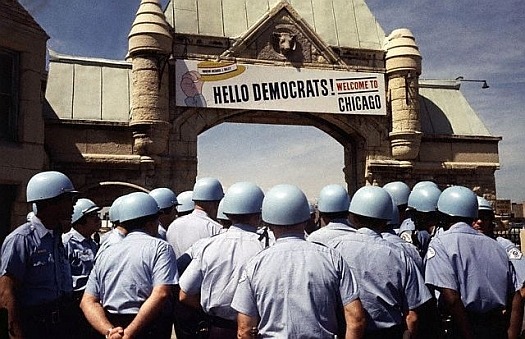
View On WordPress
#1968#1968 Chicago Convention#1968 Democratic National Convention#1968 Presidential Election#Anti-War Movement#Chicago#Chicago 1968#Counter-Culture#Democratic Party#Far Left#Green Party#Hubert Humphrey#Lyndon Johnson#New Left#Occupy Wall Street#Students For a Democratic Society#The 1960s#Vietnam War
3 notes
·
View notes
Text
We All Need Absolution.
Without absolution, we falter. Without owning our mistakes, we move ahead blindly.
Absolution is about forgiving ourselves, our past selves. Alice McDermott presents two women from different generations confessing to their imperfect pasts.
In the author’s own words, Absolution is “an exchange of memories: those of a young American wife who lined in Saigon in 1963, and of a woman who was a child, the daughter of an American oil executive, in the same time and place.”
Tricia…

View On WordPress
0 notes
Text
been rewatching forrest gump and was amazed by some parallels to what’s going on today during the protests scene in Washington and also the black panther scene (precisely the poster that said „columbia is the enemy of all black people“) but also it reminded me how I once read about Jane Fonda being an ally to the black panther movement and I read she was very active in the political opposition in the 60s and 70s but a bit further research now showed me that in 1981 or 1982 she apparently came to occupied palestine to entertain israeli troops as they were invading lebanon and I also saw her going to an „israeli left wing“ (sorry there’s no such thing imo even the left is right in israhell) demo against occupation nine years ago and another quote where she said she loved israel and that she has been „many times and it was love at first sight“ I really don’t get this Jane you been on the good side for so long why is this an exception
#she was anti-Vietnam war#she supported the Black panthers and indigenous American movements#but all she did currently is call for a CEASEFIRE#like that’s the bare minimum if anything at all#it’s like ceasefire… AND THEN WHAT#THEN WHAT JANE#free palestine
0 notes
Text
Christopher Mathias at HuffPost:
A coalition of 185 social justice and religious groups published an open letter Monday expressing support for the campus protest encampments sweeping the country in opposition to Israel’s siege of Gaza, and calling on university administrators to end the brutal crackdowns of the student-led demonstrations.
“We commend the students who are exercising their right to protest peacefully despite an overwhelming atmosphere of pressure, intimidation and retaliation, to raise awareness about Israel’s assault on Gaza — with U.S. weapons and funding,” the letter states. “These students have come forth with clear demands that their universities divest from corporations profiting from Israeli occupation, and demanding safe environments for Palestinians across their campuses. ”
Groups that signed the letter include Gen-Z for Change, Working Families Party, IfNotNow Movement, Young Democrats of America Black Caucus, Movement for Black Lives, Sunrise Movement, MPower Change, Jewish Voice for Peace, Palestine Legal, and the Unitarian Universalist Association.
Some 900 students have been arrested during anti-war encampments and demonstrations at American universities in the last 10 days, per a tally from Al Jazeera — a tumultuous period that mirrors volatile demonstrations against the Vietnam War in 1968, when police arrested at least 700 students.
The open letter Monday represents one of the largest shows of support among progressive groups for the burgeoning student protests, and makes clear the divide between establishment Democratic figures and social justice groups when it comes to U.S. support for Israel. President Joe Biden has refused so far to condition the sale of weapons to Israel.
“Our communities have been horrified to see the militarized and violent response to students protesting an ongoing genocide funded and supported by our government, and our coalition of organizations join millions of our members across the country in standing in solidarity with the students’ efforts in support of the people of Gaza,” Yasmine Taeb, one of the main organizers of the letter, told HuffPost. Taeb is a human rights lawyer and political director at MPower Change, a Muslim social justice group.
“Instead of attacking young people mobilizing for Palestinian human rights, President Biden needs to listen to the majority of Americans who have been calling on him to stop funding and supporting the atrocities committed against the people of Gaza,” Taeb said.
[...]
Israel has killed over 33,000 Palestinians since Oct. 7, when the Gaza-based militant group Hamas launched an attack in which nearly 1,200 Israelis were killed. In January, the International Court of Justice ruled that Israel’s siege of Gaza — which has displaced 85% of the population and put the occupied territory on the cusp of famine — left Palestinians at risk of experiencing a genocide. Last week, health officials in Gaza said medics had discovered mass graves at hospitals raided by Israeli troops.
“We join [the students] in calling for an immediate and lasting ceasefire and an end to the U.S. government’s and institutions’ role in the ongoing genocide of Palestinians in Gaza,” Monday’s letter states.
“As we stand in solidarity with the students protesting in encampments across the country, we reaffirm our commitment to amplifying their voices, condemn the university administration officials’ violent response to their activism, and demand that universities remove the presence of police and other militarized forces from their campuses,” it continues.
[...]
Meanwhile, Republican Party officials and right-wing media figures have accused the demonstrations of antisemitism, falsely equating criticism of Israel with bigotry towards Jews. Although there have been scattered reports of actual antisemitic incidents at or near the encampments, many were not perpetrated by students but by interlopers. Many of the student protesters across the country are Jewish.
Far-right agitators, including Christian nationalist activists, have also targeted the encampments, with MAGA pastor Sean Feucht leading hundreds of Christian and Jewish Zionists on a march around the Columbia campus on Thursday. The rally ended with pro-Israel demonstrators yelling through the gate at pro-Palestinian Columbia students. “Go back to Gaza!” they screamed.
More than 185 groups, including IfNotNow, Jewish Voice For Peace, MPower Change, and Working Families Party, signed a letter in support of the campus protests against Israel Apartheid State's genocide against Palestinians in Gaza.
#Gaza Genocide#Israel Apartheid#Israel/Hamas War#Ceasefire NOW Protests#Protests#Columbia University#Israel Apartheid State#Palestine#Gaza#IfNotNow#Jewish Voice For Peace#MPower Change#Working Families Party#Sunrise Movement#Gen Z For Change#Campus Protests
748 notes
·
View notes
Text
by POTKIN AZARMEHR
‘Pro-Palestine’ protests have become a near-weekly occurrence across Britain. Since Hamas’s 7 October massacre, regular marches have been drawing in a growing number of young people, marked by passionate advocacy and fervent slogans. Yet despite their zeal, many of these protesters lack a fundamental understanding of the conflict they are so vociferously decrying.
In the past six months, I have attended many of these marches. Having engaged with numerous protesters, I have noticed a startling disconnect between their strong opinions on the Gaza conflict and their shaky grasp of basic facts about it. Among the most perplexing are the LGBT and feminist groups (the ‘Queers for Palestine’ types) who flirt with justifying Hamas’s atrocities. This is a bewildering alliance, given that Hamas’s Islamist ideology is clearly antithetical to the rights and values these groups claim to champion. Its reactionary agenda is profoundly hostile to women’s rights and LGBT individuals.
Protesters seem eager to make excuses for Hamas, but are conspicuously uninformed about exactly what or who this terrorist group represents. On 18 May, during a protest at Piccadilly Circus in London, I spoke to demonstrators who firmly believed that Hamas represents all Palestinians. When I questioned a well-educated participant about the last Palestinian election, she was unaware that none had occurred since 2006, when Hamas gained power in Gaza.
It wasn’t just young people who were uninformed. An older woman with an American accent, seemingly a veteran protester, admitted she knew that Hamas was linked to the Muslim Brotherhood, but had no deeper knowledge of its ideology or history. Others, such as members of revolutionary socialist groups, displayed similar gaps in understanding, unaware of critical events like the 1979 Iranian Revolution.
That revolution gave birth to the Islamic Republic of Iran, a theocratic regime that brutally oppresses its own citizens. It also sponsors Islamist groups like Hamas. I left Iran for the UK not long after that regime began and have spent years resisting its religious extremism and ruthless political intolerance. Protesters were not only unaware of these facts about the Iranian regime, but also ill-informed about the struggle against it, such as the ‘Woman, Life, Freedom’ protests against the government that began in 2022.
One particularly telling conversation involved a man advocating for a ‘Global Intifada’ to replace capitalism with socialism. When asked about successful socialist models, he was unfamiliar with the Israeli kibbutzim, one of history’s few successful egalitarian experiments. His ignorance of these communal settlements in Israel, built by socialist Jewish immigrants, was all too typical.
Perhaps the most telling moment was captured by commentator Konstantin Kisin earlier this year, when he encountered a young man holding a ‘Socialist Intifada’ placard. The protester admitted he had no idea what this meant and that he had taken the sign simply because it was handed to him.
Reflecting on past movements, such as the American anti-Vietnam War protests of the 1960s and the British Anti-Apartheid Movement of the 1980s, one can’t help but note a stark contrast. Protesters then were generally well-informed about their causes. Today’s pro-Palestine protests, however, seem to be driven more by unthinking fervour than by an understanding of the issues at hand.
Throughout all these protests, I am yet to encounter a single participant who condemns Hamas or carries a placard denouncing its terrorism. This not only undermines the protesters’ cause, but also risks aligning them with groups whose values fundamentally oppose the very rights and freedoms they claim to support. It appears that today’s young protesters are high on ideology, but woefully thin on facts.
Potkin Azarmehr is an Iranian activist and journalist who left Iran for the UK after the revolution of 1979.
285 notes
·
View notes
Text
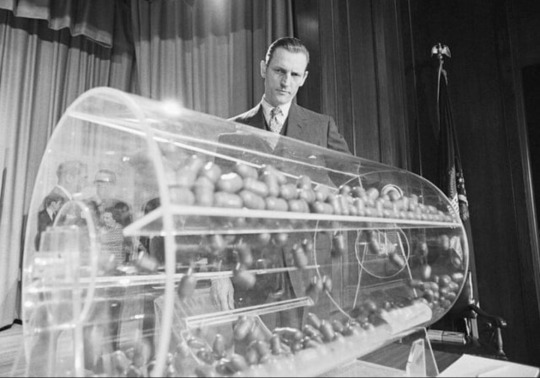
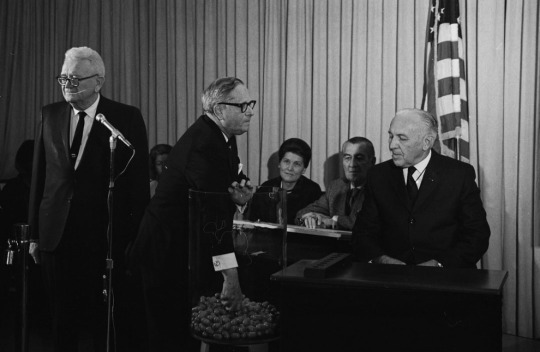
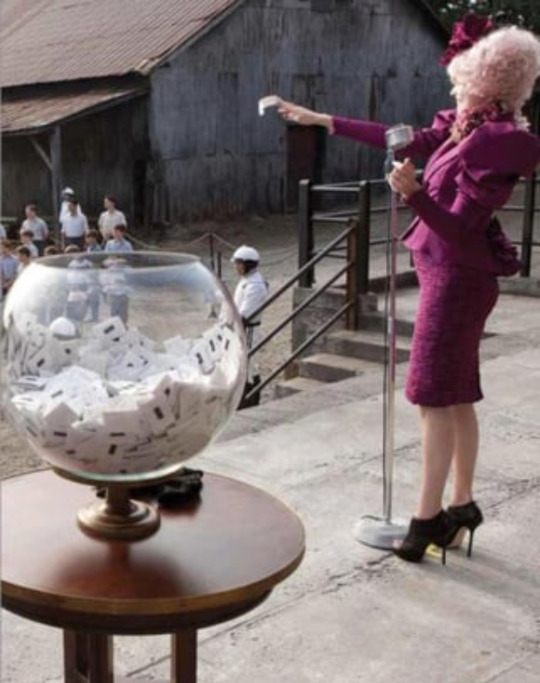
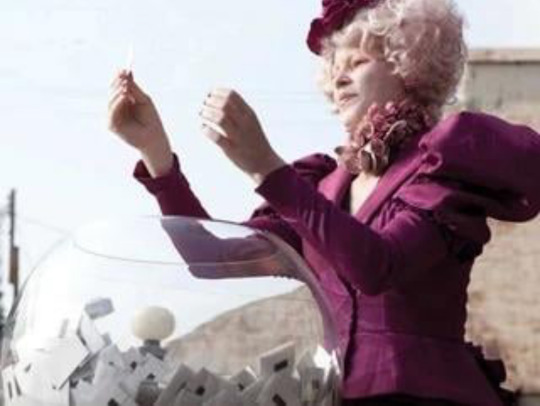
Reposting my most popular Reddit post from r/Hungergames!
Could the Reaping in the Hunger Games be inspired by the 1969 Vietnam War lottery draft?
As we know, Suzanne Collins was inspired to write the series after flipping through tv channels, surfing between the Iraq War and reality tv and realizing that the lines became blurred. Collins’s father served in the Vietnam War, and I’m sure she heard many stories from him. In 1969, the Vietnam War was raging and its unpopularity was being felt all around the USA with growing anti war movements. Because of this, a draft was instated, and here’s how it worked.
366 blue capsules in a jar, one for each day of the year (leap year included). If your birthdate was drawn, congratulations son! You’re first in line to serve the empire. The first date drawn was September 14th, and the last was June 8th. They did this again in December, with letters instead of numbers. The last draft lottery was in 1975, and from 1965-1972, over two million men were forced to fight because of this. There are strong parallels between the Vietnam lottery and the Reaping. During the Vietnam War, poor, uneducated men were more likely to be chosen, as the rich could pay their way out of service. Much like the impoverished Districts being unable to resist. The Hunger Games is a much deeper series than some people give it credit for. It explores issues such as imperialism, propaganda, capitalism in decay, and revolution. It’s not just “some kids story.” It’s even more radical than we remember. Reading again as an adult has been incredibly rewarding. The imperial core (USA, UK, Japan, Canada, etc.) is the Capitol. The imperial periphery (Iran, Vietnam, Cuba, Yemen, etc.) are the Districts. The truth is stranger than fiction.
#effie trinket#hunger games#the hunger games#everlark#history#dystopian#anti capitalism#the truth is stranger than fiction#vietnam war#reaping day#suzanne collins
183 notes
·
View notes
Video
youtube
LECTURE 19: COMING APART (PART 2): If you’ve got an hour and 11 minutes to spare, have a look at this documentary about the so-called Bed-Ins that proved to be a favourite tactic of John Lennon and Yoko Ono in their anti-Vietnam War activism. They held their famous Montreal Bed-In at the Queen Elizabeth Hotel from May 26 to June 2, 1969. At about 8 minutes into the documentary, cartoonist Al (Li'l Abner) Capp comes walking into their hotel room in Montreal, introducing himself as a “dreadful fascist.” Capp leaps into a heated debate with Ono and Lennon about their Bed-In. He’s full of sarcasm and insults, even though he tries to stay jovial, and, at times, he seems open to hearing other points of view. It’s clear that Capp is a cultural conservative who doesn’t care for antiwar protests. Dick Gregory also makes a moving appearance in the film, after Capp is done ranting. There are lots of other lively scenes in the documentary, and it is an important document of its time, and it demonstrates convincingly that John and Yoko were committed to peace activism. Hang in there until about 51 minutes into the film, when John and Yoko perform a rousing version of “Give Peace a Chance.”
#John Lennon#Yoko Ono#Bed-Ins#Anti-Vietnam War Movement#Al Capp#Dick Gregory#Give Peace a Chance#documentaries#film#cinema#Montreal#1969
2 notes
·
View notes
Video
youtube
Lecture 6: Folk singer Phil Ochs’ most famous antiwar protest ballad, “I Ain’t Marching Anymore,” became a staple at anti-Vietnam War demonstrations in the 1960s and early 1970s. In many ways, it is the quintessential Sixties-era protest song. Ochs described himself as a“singing journalist,“ and his protest music took him from the quaint neighbourhoods of Greenwich Village – where folk music abounded in the early 1960s – to the biggest demonstrations of the Vietnam Era. Tragically, Ochs – a man tormented by bipolar disorder and struggles with alcoholism – committed suicide in 1976.
#Phil Ochs#folk music#Folk Revival#protest music#1960s#I Ain't Marching Anymore#Greenwich Village#New York City#Anti-Vietnam War Movement
3 notes
·
View notes
Text
Mario Savio giving a speech at Berkeley in 1964 during an occupation of the university.
I mistakenly labeled this as an occupation and speech against the Vietnam war. It was in fact an occupation by the Free Speech Movement, who objected to attacks on free speech and academic freedom during the cold war, when "radical" student groups were banned and faculty had to swear an anti-Communist loyalty oath or be fired. Students objected to universities being used as a source of knowledge and innovation for the military industrial complex but not being allowed to speak their minds that, which does have a lot of parallels with the current occupations.
There's a time when the operation of the machine becomes so odious, makes you so sick at heart that you can't take part!
You can't even passively take part!
And you've got to put your bodies upon the gears and upon the wheels, upon the levers, upon all the apparatus -- and you've got to make it stop!
And you've got to indicate to the people who run it, to the people who own it -- that unless you're free the machine will be prevented from working at all!!
#1964#mario savio#speech#berkeley#students#student protest#anti-war#free palestine#palestine#university#occupation#Berkeley Free Speech Movement
2K notes
·
View notes
Text
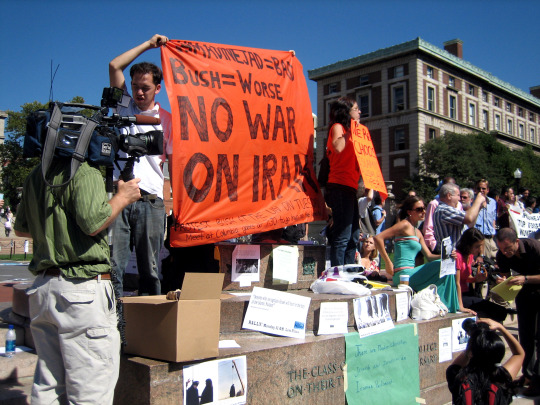
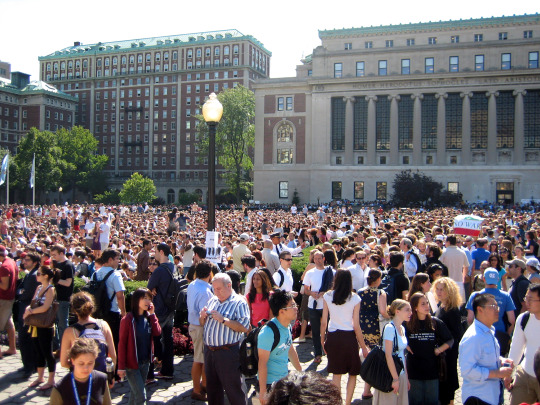
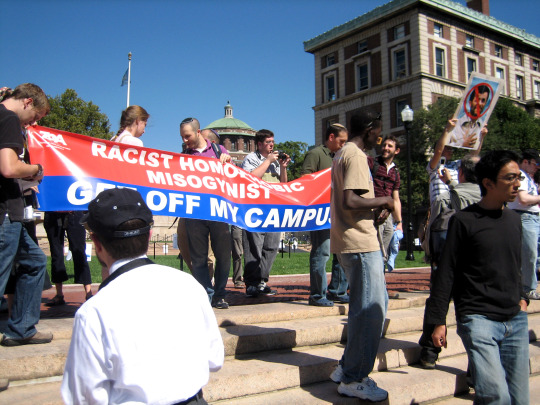
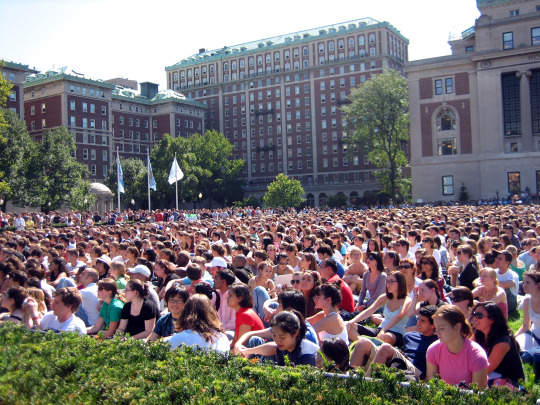
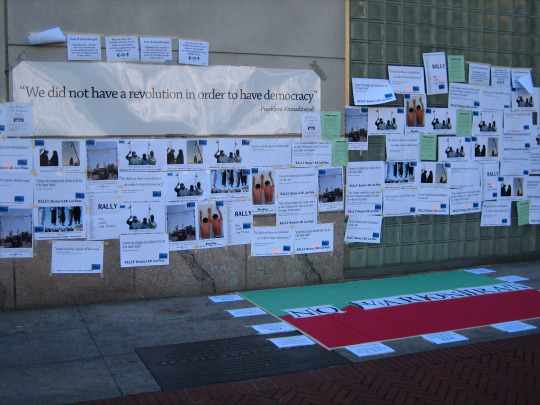

TBT to the late 00s when I was an undergrad at Columbia. It was a time when political activism and student protests saw a renaissance on campus; every year, for all 4 years I attended, there were protests—a resurgence of the spirit of '68. (I remember a meme going around comparing Ivy League schools with "How many students does it take to change a lightbulb at <insert Ivy here>?" The one for Columbia went something like "61. 1 to change the lightbulb, 30 to protest it, and 30 to counter-protest." I couldn't be more pleased, especially since the stereotypes for other Ivies were far less flattering.)
In 2007, then-President of the university Lee C. Bollinger, who was also a Free Speech scholar, invited then-President of Iran Mahmoud Ahmadinejad to speak on campus. There were protests against Ahmadinejad's arrival, and there were counter-protests, the latter calling out George W. Bush and US imperialism and upholding an anti-war message. Here are some photos I took the day of the event:
1 - Counter-protesters
3 - Protesters
4 - Students watching the event
5 - Flyers from protesters and counter-protesters
6 - Media outside the gates on Broadway
That same semester, there was a student hunger strike, calling for a reform of the Core Curriculum and expansion of the Ethnic Studies program and protesting the university's gentrification of Harlem. (I didn't take photos; this time I personally knew the protesters.) Students camped out in tents on the Lawn. And you know what? They weren't evicted. They weren't suspended. The cops weren't called. In fact, the university administration negotiated with them and agreed to meet some of their demands—the strikers won a new Major Cultures seminar requirement as part of the Core.
In 2008, on a panel commemorating the 40th anniversary of the 1968 uprising, Bollinger said, “You simply do not bring police onto a campus. All the assurances in the world cannot be kept” that police presence on campus will not result in violence.
Etc.
To the current student protestors, you are continuing Columbia tradition, and I am proud of CU students for sparking a nationwide movement. (The occupation of Hamilton Hall also harkens back to '68, when students seized control of the building to protest the Vietnam War and the proposal of a gymnasium in Morningside Park with separate entrances for students vs. the community. The spirit lives on indeed.)
To the current administration under Minouche Shafik... Sending in an armed and militarized NYPD as a response to kids peacefully protesting? How does that keep anyone safe? I can't imagine Bollinger would've been OK with how you're handling the situation. We alumni are watching.
// (c) Jenny Lam 2007
#free palestine#ceasefire now#palestine#gaza#ceasefire#from the river to the sea palestine will be free#palestine will be free#save palestine#free gaza#throwback#00s#2000s#columbia university#protest#student protests#nyc#history#activism#protests#columbia
203 notes
·
View notes
Text
Reading List for the Student and Youth Anti-Vietnam War Movement
Personal Statements by Draft Resisters and their Families
Muhammad Ali's speech
"I Picked Prison Over Fighting in Vietnam"
"We Won't Go: Personal Accounts of War Objectors"
"Resister: A Story of Protest and Prison during the Vietnam War" (free sample of full-length book)
"Suppose They Gave a War and Nobody Came"
Prosecution of War Resisters
"Draft Card Burning"
"Constitutional Law - Free Speech - Draft Card Burning - U.S. v.
Miller"
Civil Rights Speeches
"On Black People and War" by Malcolm X
The Liberation of Our People: Transcript of a Speech Delivered by Angela Y. Davis
"An Open Letter to My Sister, Angela Davis" by James Baldwin
"Beyond Vietnam" by Martin Luther King Jr.
People that got on a boat and delivered medical aid to Vietnam
"An American Boat Sailed to Vietnam During the War. Then It Disappeared"
Homosexuality Draft Exemptions
"Coming Out Against the Vietnam War"
"Psychiatry and Homosexuality Draft Exemptions during the Vietnam War"
Primary Documents Critical of the Youth Movement
"Nuremberg and Vietnam"
"What's Bugging the Students?"
"On Civil Disobedience" (not the essay by Thoreau)
"The American Peace Movement and the National Security State, 1941-1971"
"Vietniks" (see also: David Miller's letter to the editor)
212 notes
·
View notes